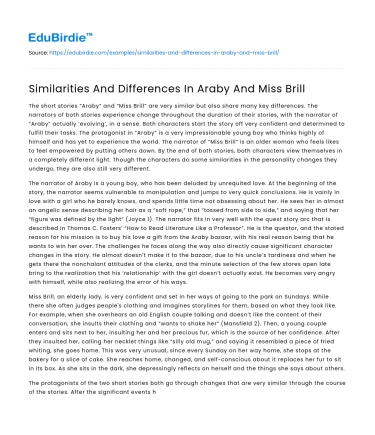The short stories “Araby” and “Miss Brill” are very similar but also share many key differences. The narrators of both stories experience change throughout the duration of their stories, with the narrator of “Araby” actually ‘evolving’, in a sense. Both characters start the story off very confident and determined to fulfill their tasks. The protagonist in “Araby” is a very impressionable young boy who thinks highly of himself and has yet to experience the world. The narrator of “Miss Brill” is an older woman who feels likes to feel empowered by putting others down. By the end of both stories, both characters view themselves in a completely different light. Though the characters do some similarities in the personality changes they undergo, they are also still very different.
The narrator of Araby is a young boy, who has been deluded by unrequited love. At the beginning of the story, the narrator seems vulnerable to manipulation and jumps to very quick conclusions. He is vainly in love with a girl who he barely knows, and spends little time not obsessing about her. He sees her in almost an angelic sense describing her hair as a “soft rope,” that “tossed from side to side,” and saying that her “figure was defined by the light” (Joyce 1). The narrator fits in very well with the quest story arc that is described in Thomas C. Fosters’ “How to Read Literature Like a Professor”. He is the questor, and the stated reason for his mission is to buy his love a gift from the Araby bazaar, with his real reason being that he wants to win her over. The challenges he faces along the way also directly cause significant character changes in the story. He almost doesn’t make it to the bazaar, due to his uncle’s tardiness and when he gets there the nonchalant attitudes of the clerks, and the minute selection of the few stores open late bring to the realization that his ‘relationship’ with the girl doesn’t actually exist. He becomes very angry with himself, while also realizing the error of his ways.
Save your time!
We can take care of your essay
- Proper editing and formatting
- Free revision, title page, and bibliography
- Flexible prices and money-back guarantee
Miss Brill, an elderly lady, is very confident and set in her ways of going to the park on Sundays. While there she often judges people's clothing and imagines storylines for them, based on what they look like. For example, when she overhears an old English couple talking and doesn’t like the content of their conversation, she insults their clothing and “wants to shake her” (Mansfield 2). Then, a young couple enters and sits next to her, insulting her and her precious fur, which is the source of her confidence. After they insulted her, calling her necklet things like “silly old mug,” and saying it resembled a piece of fried whiting, she goes home. This was very unusual, since every Sunday on her way home, she stops at the bakery for a slice of cake. She reaches home, changed, and self-conscious about it replaces her fur to sit in its box. As she sits in the dark, she depressingly reflects on herself and the things she says about others.
The protagonists of the two short stories both go through changes that are very similar through the course of the stories. After the significant events happen in “Araby”, the narrator saw himself as “a creature driven and derided by vanity,” and his eyes “burned with feelings of anguish and anger” (Joyce 5). After Miss Brill is teased by the young couple, she goes home feeling depressed and puts what she thought was her best fur back in its box, feeling self-conscious. Both characters feel versions of self-resentment, with the young boys being more aggressive and immature, and Miss Brill’s being more melancholy. They are also both deluded, led astray by their overactive imaginations. While Miss Brill critiques and creates stories off visual impressions, the star of “Araby” creates a love from nothing and drives himself crazy trying to fill the girl’s material needs. And after their fantasies came crashing down, they both started to feel the aforementioned feelings of self-pity.
Though there are many similarities between the two bodies of work, many differences can also be highlighted. During the story, both characters are misled by their overactive imaginations. The young boy of “Araby” overreacts to a flirtatious young girl and is disappointed when the future he planned with her doesn’t materialize. But unlike Miss Brill, who is old and set in her ways, he still has time to learn. The boy can take his experiences and learn from them, turning them int a life lesson. However, Miss Brill has lived through the course of her life being an observant and judgmental introvert and doesn’t have much value in changing the error of her ways. Another difference between the two characters is while “Araby’s” protagonist fits Foster’s hero archetype, Miss Brill’s plotline doesn’t have all the necessary elements to be classified as a ‘quest’. The protagonist of “Araby” is the questor, and the stated reason for his mission is to buy his love a gift from the Araby bazaar, with his real reason being that he wants to win her over. The story also includes challenges along his journey. 'Miss Brill” on the other hand lacks the presence of a place to go, reasons to go there, and items to be received once she [Miss Brill] arrives.
In both stories, the characters end with a different view of themselves. Although the two stories are different, they have similarities. They are both highly imaginative people, who lose touch of what is imaginary and tangible. Bu the way events unfold are very different, and the end results are also dissimilar.






 Stuck on your essay?
Stuck on your essay?

